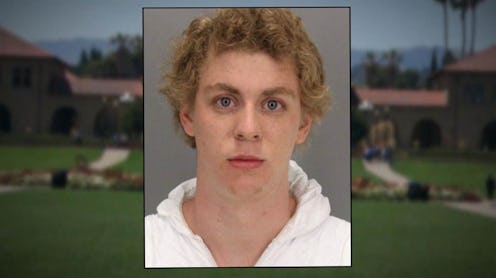
In her essay "White Crime," which is featured in the June 14 edition of Lenny Letter, Roxane Gay explores race's role in Brock Turner's case. She explains how the sexual assaulter's gentle treatment by law enforcement and the court exemplifies the criminal justice system's tendency to favor whiteness while sentencing criminals. Gay, a feminist writer and associate professor of English at Purdue University, poignantly attributes Turner's privilege to one phrase: "This is how whiteness works." You can read the full letter by signing up for Lenny here.
Turner's sentence infuriated the nation, but Gay tells her audience to open their eyes. This type of situation, she argues, is nothing new. It shouldn't come as a surprise. In reality, the outcome of the trial exemplifies a trend which statistics have shown to be blatantly obvious. Gay cites the America Civil Liberties Union's report on racial disparities in sentencing, which suggests that a black man's sentence will be 20 percent longer than a white man's for the same crime. And unlike a black man, Turner and his family were allowed to refute the severity of his crime. Ultimately, they walked out of the courtroom all but unscathed by the law.
In his "20 minutes of action" letter, for example, Turner's father refused to believe that his son's crime was legitimate. And in his own letter to the judge, Turner lamented his decision to drink, not his decision to sexually assault an unconscious woman behind a dumpster. Ultimately, the judge assigned Turner a light sentence, expressing his fear that prison could negatively affect his future. Gay maintains that if Turner was a minority, the judge wouldn't have seen a future. She describes how minorities are treated in court:
Rarely are these men seen as human, treated as human. They are not sons, fathers, brothers, or friends. They are not men. Instead, they are criminals, and worse, there is no hope for their redemption, there is no possibility that they are anything more than their misdeeds, their mistakes.
Gay goes on to make a point that cuts deeply: In the court system, innocence and blackness are perceived as "antithetical." She mentions Trayvon Martin and Tamir Rice, who were scrutinized even though they were victims. What's more disturbing is that, at 17 and 12 years old, respectively, they were just children. Even in death, doubt about their innocence loomed over them.
And then there was Turner. Judge Persky worried how he, a 20-year-old white adult, would fare in prison. The man might as well have been tried as a child. And he can thank the color of his skin.
Gay writes, "His crime is a mistake, not a scarlet letter, not a reflection of his character." The Santa Cruz Police Department played into this when they waited months to release Turner's mugshot. Newspapers reminded readers that Turner had a future as a swimmer at Stanford. The clean-cut yearbook photo that was used in place of a mugshot seemingly validated that bright future. But Turner's isn't the future we should be worrying about. The woman he assaulted cannot take back the fact that she was stripped of control over her own body. Upon reading her letter to the court, it's crystal clear that her injuries were both physical and emotional.
"High grades and athleticism and sharp haircuts and 'good' families excuse all manner of bad behavior," Gay says. This gross willingness to excuse Turner's behavior blinded even him from realizing his own crime. Or at least, allowed him to pretend to do so. Ultimately, race determines where society draws a line between the one-time mistake of an otherwise "good kid" and a full-fledged crime. It's difficult to believe that Judge Persky chose to view Turner's action as the former after the victim herself stood up and read her account of the night and how it affected her.
Gay ends with a heartbreaking personal testament. She was once the victim of so-called "boys next door." It didn't make their crime any less severe:
I was a victim once. The boys who raped me were boys like Brock Turner. They were athletes, popular, clean cut. They came from good families and so did I. There is some benefit in reminding people that criminality lurks in all kinds of places and that goodness provides cover for all kinds of badness.
It could happen in the frats. It could happen in the inner-city streets. It could be committed by a black man. It could be committed by a white man. If the crime was a crime, it doesn't matter.